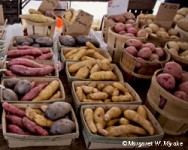Event Details
Date
December 17, 2015
Time
9:30 AM - 3:00 PM
Location
CCE Ontario County
480 North Main St
Canandaigua, NY 14424
Cost
$12.00 for lunch
pre-register if you wish lunch
Host
Cornell Vegetable ProgramCarol MacNeil
585-313-8796
email Carol MacNeil
2015 Upstate New York Potato Advisory Meeting
December 17, 2015
Growers, consultants, processors, packers, extension, college and agency personnel are encouraged to come and discuss the concerns, needs and opportunities of the Upstate NY potato industry. We will begin with a Roundtable for everyone to share their concerns and interests. Growers are asked to bring ideas for needed research, extension programming, and industry projects. The tentative agenda is below. DEC and CCA credits will be available.
9:30 am Registration, refreshments, and sign up for DEC/CCA credits
10:00 Call meeting to order - Dave Votypka, Chairman
10:05 Introductions
10:10 Review of season, industry needs, and opportunities for the future -
11:00 Late blight update - 2015 - Bill Fry and Abby Seaman, Cornell
11:30 Pre-plant risk assessments for nematodes and soil-borne diseases of potato - Sarah Pethybridge/Frank Hay, Cornell
11:45 Potato seed and seed-borne disease issues - Keith Perry, Cornell
12:15 pm LUNCH
1:15 2015 Cornell potato breeding line and variety trial results - Walter DeJong, Cornell
1:45 Golden Nematode program update - Dan Kepich, USDA-APHIS, and Xiaohong Wang, Cornell
2:05 Potato Insect management update - Brian Nault, Cornell
2:20 Upcoming potato meetings, future potato meetings -
Tues, Jan 19 - Potato Sessions at Empire State Producers Expo, Syracuse
Wed, Jan 20 - Golden Nematode Technical Workgroup
Thurs, Feb 18 - Potato Grower-Processor Meeting, Club 57, Hornell
2:40 Other topics
3:00 Adjourn, and collect your DEC pesticide certificate
If you have questions or additional agenda items,contact David Votypka at 585-315-1094 or email David, or you can contact Carol MacNeil. If you have questions regarding weather the day of the meeting call Carol MacNeil.
Preregister by Thursday, December 10, to ensure your lunch ($12): Email Carol or call 585-313-8796.



































